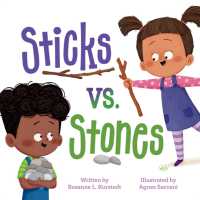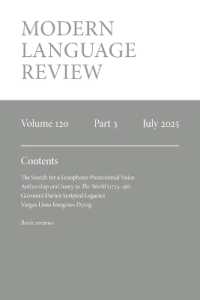- ホーム
- > 洋書
- > 英文書
- > Literary Criticism
Full Description
Offering a fresh comparative lens, this volume demonstrates how postcolonial writers have transformed the Bildungsroman from an eighteenth-century European genre meant to explore local themes around childhood development into one of the most cosmopolitan literary mediums for communicating overlapping concerns about global modernity. Chapters examine identity, sexuality, human rights, the climate crisis, neoliberal globalization, and a host of other issues in work from a wide range of postcolonial locations across Asia, Europe, Africa, the Americas, Australia, and New Zealand. Forging productive engagements between narratology and genre theory, the volume documents the aesthetic and thematic shifts that have accompanied the Bildungsroman over time, particularly in the context of anticolonial, liberationist, and self-determination struggles from the mid-twentieth century onwards in the Global South. With essays from multiple continents, The Postcolonial Bildungsroman makes a crucial intervention to the existing scholarship on this influential genre and a unique contribution to the study of world literature. Contributors: David Babcock, Sarah Brouillette, Gregory Byala, Deena Dinat, Prathim-Maya Dora-Laskey, José-Santiago Fernández-Vázquez, Ericka A. Hoagland, Elizabeth Jackson, Feroza Jussawala, Andrew David King, Aruna Krishnamurthy, Simone Maria Puleo, Peter Ribic, Arnab Dutta Roy, Craig Smith, Antonette Talaue-Arogo, Paul Ugor, Julieann Veronica Ulin, Rachel Ann Walsh, Maria Su Wang, Bethany Williamson, Helena Wu, Julia Wurr.
Contents
Acknowledgements
I.
The Postcolonial Bildungsroman
Introduction: The Postcolonial Bildungsroman
Arnab Dutta Roy (Florida Gulf Coast University) and Paul Ugor (University of Waterloo)
II.
Historicizing the Postcolonial Bildungsroman
Chapter 1— Reading the Classical Bildungsroman as a Colonial Genre
José-Santiago Fernández-Vázquez (University of Alcalá)
Chapter 2—"Couldn't you be broken and still bring change?": Nnedi Okorafor's Binti Trilogy
Ericka Hoagland (Stephen F. Austin State University)
III.
Coloniality, Postcoloniality, Cosmopolitanism and the Bildungsroman
Chapter 3— Contextualizing the Postcolonial Bildungsroman
Feroza Jussawalla (University of New Mexico)
Chapter 4—"Sono Un Crocevia:" Igiaba Scego's La mia casa è dove sono as Diaspora Bildungsroman
Simone Puleo (Central Connecticut State University)
Chapter 5—The Cosmopolitan Bildungsroman
Antonette Talaue-Arogo (De La Salle University Manila)
IV.
Childhood, Nation, and Narration
Chapter 6— History as Murmur: Derek Walcott's Another Life as Postcolonial Bildungsroman Andrew David King (UC Berkeley)
Chapter 7— Upendra Nath Ashk's Falling Walls: Bildungsroman of The Lost Youth of Independent India
Aruna Krishnamurthy (Fitchburg State University)
Chapter 8— Recovering Those Who "Trod": Disrupting the Bildungsroman in Shūsaku Endō's Silence
Maria Su Wang and Bethany Williamson (Biola University)
Chapter 9— The Truth and Reconciliation Commission, the Bildungsroman, and the "New" South African Subject
Deena Dinat (University of British Columbia)
Chapter 10—"We Come too Late to the Scene": Goh Poh Seng, Developmental Time, and the Singapore Story
Peter Ribic (Fontbonne University)
V.
Modernity and the Postcolonial Bildungsroman
Chapter 11— Bad Modernization: The Carceral States Bildungsroman in Postcolonial Africa Craig Smith (Northwestern Polytechnic)
Chapter 12—"For Every Child, Every Right:" Reading Postcolonial Bildungsromane of the 1990s across the United Nations Convention on the Rights of the Child (1990)
Prathim-Maya Dora-Laskey (Alma College)
Chapter 13— Organi(ci)zation of the African Intellectual: Bildung and Representativeness in the Fiction of Chimamanda Ngozi Adichie
David Babcock (James Madison University)
Chapter 14—(Be)Coming of Age in Postmillennial Hong Kong Literature: Between Humans and Things in Hon Lai-Chu's Works
Helena Wu (University of British Columbia)
VI.
Identity Politics and the Postcolonial Bildungsroman
Chapter 15— Amos Tutuola and the Novel of Transformation
Gregory Byala (Temple University)
Chapter 16— Coming of Age with Ambiguous Identities and a Sense of Shame in Zoë Wicomb's You Can't Get Lost in Cape Town and David Dabydeen's The Intended
Elizabeth Jackson (University of the West Indies)
Chapter 17—"No sign of improvement anywhere": Phantom Development in Seamus Deane's Reading in the Dark
Julieann Veronica Ulin (Florida Atlantic University)
Chapter 18— Replotting the Bildungsroman through a Queer Poetics of the "Post" in Ocean Vuong's On Earth We're Briefly Gorgeous
Rachel Ann Walsh (Bowling Green State University
Chapter 19— Childlessness and the Female Nigerian Bildungsroman
Julia Wurr (University of Oldenburg)
VII.
Concluding Remarks
Afterword
Sarah Brouillette (Carleton University)
Contributors
Index






